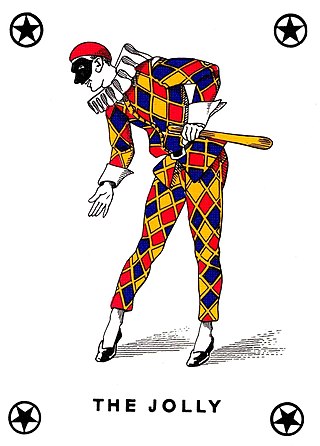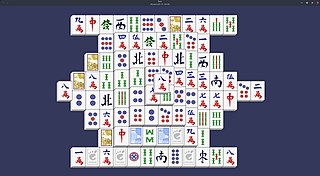Related Research Articles

A card game is any game that uses playing cards as the primary device with which the game is played, whether the cards are of a traditional design or specifically created for the game (proprietary). Countless card games exist, including families of related games. A small number of card games played with traditional decks have formally standardized rules with international tournaments being held, but most are folk games whose rules may vary by region, culture, location or from circle to circle.

Dominoes is a family of tile-based games played with gaming pieces. Each domino is a rectangular tile, usually with a line dividing its face into two square ends. Each end is marked with a number of spots or is blank. The backs of the tiles in a set are indistinguishable, either blank or having some common design. The gaming pieces make up a domino set, sometimes called a deck or pack. The traditional European domino set consists of 28 tiles, also known as pieces, bones, rocks, stones, men, cards or just dominoes, featuring all combinations of spot counts between zero and six. A domino set is a generic gaming device, similar to playing cards or dice, in that a variety of games can be played with a set. Another form of entertainment using domino pieces is the practice of domino toppling.

Mahjong is a tile-based game that was developed in the 19th century in China and has spread throughout the world since the early 20th century. It is played by four players. The game and its regional variants are widely played throughout East and Southeast Asia and have also become popular in Western countries. The game has also been adapted into a widespread online entertainment. Similar to the Western card game rummy, mahjong is a game of skill, strategy, and luck. To distinguish it from mahjong solitaire, it is sometimes referred to as mahjong rummy.

Games of patience, or (card) solitaires as they are usually called in North America, have their own 'language' of specialised terms such as "building down", "packing", "foundations", "talon" and "tableau". Once learnt they are helpful in describing, succinctly and accurately, how the games are played. Patience games are usually for a single player, although a small number have been designed for two and, in rare cases, three or even four players. They are games of skill or chance or a combination of the two. There are three classes of patience grouped by object.

Klondike is a card game for one player and the best known and most popular version of the patience or solitaire family, as well as one of the most challenging in widespread play. It has spawned numerous variants including Batsford, Easthaven, King Albert, Thumb and Pouch, Somerset or Usk and Whitehead, as well as the American variants of the games, Agnes and Westcliff. The distinguishing feature of all variants is a triangular layout of the tableau, building in ascending sequence and packing in descending order.

Uno, stylized as UNO, is a proprietary American shedding-type card game originally developed in 1971 by Merle Robbins in Reading, Ohio, a suburb of Cincinnati, that housed International Games Inc., a gaming company acquired by Mattel on January 23, 1992.

Concentration is a round game in which all of the cards are laid face down on a surface and two cards are flipped face up over each turn. The object of the game is to turn over pairs of matching cards.

The Joker is a playing card found in most modern French-suited card decks, as an addition to the standard four suits. Since the second half of the 20th century, they have also been found in Spanish- and Italian-suited decks, excluding stripped decks.

Spider is a type of patience game, and is one of the more popular two-deck solitaire games. The game originated in 1949, and its name comes from a spider's eight legs, referencing the eight foundation piles that must be filled in order to win.

Rummy is a group of games related by the feature of matching cards of the same rank or sequence and same suit. The basic goal in any form of rummy is to build melds which can be either sets or runs and either be first to go out or to amass more points than the opposition.
Canfield (US) or Demon (UK) is a patience or solitaire card game with a very low probability of winning. It is an English game first called Demon Patience and described as "the best game for one pack that has yet been invented". It was popularised in the United States in the early 20th century as a result of a story that casino owner Richard A. Canfield had turned it into a gambling game, although it may actually have been Klondike and not Demon that was played at his casino. As a result, it became known as Canfield in the United States, while continuing to be called Demon Patience in the United Kingdom and elsewhere. It is closely related to Klondike, and is one of the most popular games of its type.

Sheng ji is a family of point-based, trick-taking card games played in China and in Chinese immigrant communities. They have a dynamic trump, i.e., which cards are trump changes every round. As these games are played over a wide area with no standardization, rules vary widely from region to region.

A game is a structured type of play, usually undertaken for entertainment or fun, and sometimes used as an educational tool. Many games are also considered to be work or art.

Mahjong solitaire is a single-player matching game that uses a set of mahjong tiles rather than cards. It is more commonly played on a computer than as a physical tabletop game. It can be played using genuine tiles and a special wooden frame for set-up, although this has the tedium of set-up and the temptation to cheat.

Monte Bank, Mountebank, Spanish Monte and Mexican Monte, sometimes just Monte, is a Spanish gambling card game and was known in the 19th century as the national card game of Mexico. It ultimately derives from basset, where the banker (dealer) pays on matching cards. The term "monte" has also been used for a variety of other gambling games, especially varieties of three-card poker, and for the swindle three-card monte.

Dixit, is a French board game created by Jean-Louis Roubira, illustrated by Marie Cardouat, and published by Libellud. Using a set of cards illustrated with dreamlike images, players select cards that match a title suggested by the designated storyteller player, and attempt to guess which card the storyteller selected. The game was introduced in 2008. Dixit won the 2010 Spiel des Jahres award.

The following is a glossary of terms used in card games. Besides the terms listed here, there are thousands of common and uncommon slang terms. Terms in this glossary should not be game-specific, but apply to a wide range of card games played with non-proprietary packs. It should not include terms solely related to casino or banking games. For glossaries that relate primarily to one game or family of similar games, see Game-specific glossaries.

Golf, also known as One Foundation, is a patience or solitaire card game where players try to earn the lowest number of points over the course of nine deals. It has a tableau of 35 face-up cards and a higher ratio of skill to luck than most other solitaire card games. Its easy game-play also makes it within easy reach of first-timers, while still offering scope for strategic play.

The following is a glossary of terms used in dominoes. Besides the terms listed here, there are numerous regional or local slang terms. Terms in this glossary should not be game-specific, i.e. specific to one particular version of dominoes, but apply to a wide range of domino games. For glossaries that relate primarily to one game or family of similar games, see the relevant article.
References
- ↑ Card Games: Matching Games at pagat.com. Retrieved 23 November 2022.